The grant scheme received an unprecedented number of applications which highlighted the real need for action in this space. Due to the global nature of this problem to the portfolio of projects brings a variety of regional perspectives. This will facilitate shared learnings across regional and sectorial boundaries to bring about collective impact to end open burning of waste.
Projects in Africa
Clean school operation
| Lead organisation | Gbobètô |
| Project lead | Myriam Aloegninou Bouillaud |
| Grant type | Impact |
| Focus Country | Benin, Wémé region |
Challenge
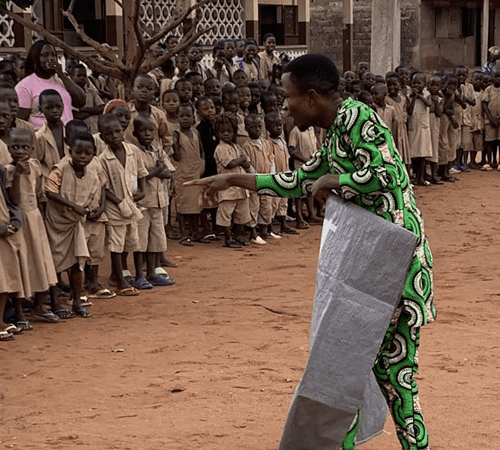
Awareness raising sessions in schools. Photo credit to Gbobètô
In the schools of the Wémé region in Benin, there is little to no waste management. All types of solid waste, especially plastics, are disposed of in the school yard before being gathered and burnt. There is little to no awareness about the health and environmental hazards of this practice. Since children learn this practice at school, it is a common and widespread practice in the area.
Approach
Gbobètô’s project aims to decrease open burning of waste by involving the school community in alternative practices based on the 3Rs: Reducing, Reusing, Recycling. ‘Reducing’ will focus on decreasing single-use plastics inside schools by providing reusable containers for catering. ‘Reusing’ will focus on allowing children to take recyclable waste from their houses to school and integrating them in Gbobètô’s recycling units. ‘Recycling’ refers to developing composting points for organic waste which will then be used for vegetable gardens in each of the 10 schools targeted.
Mitigating open burning: a framework for public awareness
| Lead organisation | ICLEI Africa |
| Project lead | Jokudu Guya |
| Grant type | Awareness raising |
| Focus Country | Africa (Regional) |
Challenge
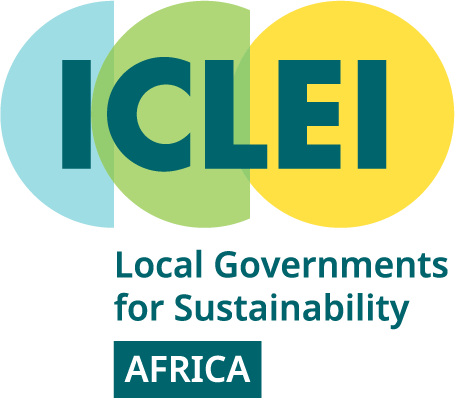
The open burning of waste in many African cities is a major challenge, especially for vulnerable groups with a lack of adequate access to waste disposal facilities, and limited knowledge of sustainable and alternative solutions to the disposal of waste. Many local governments face challenges when implementing and regulating waste management activities.
Approach
This project will develop an understanding of the key drivers of open burning in African cities and highlight practical solutions that local government officials can take. This project aims to produce an Awareness Raising Framework grounded in research and data on open burning in Africa. The project will look to support a mindset shift towards more sustainable and practical regulations that local government officials can put in place to improve solid waste management. The long-term outcome of this project aims to encourage the adoption of circular economy, reduce open waste burning, and ensure positive social impacts.
ICLEI Africa are also a member of the Multi stakeholder partnership aiming to end open burning in Africa by 2040, they are strategically well placed to supporting cities to understand key open waste burning drivers.
A multi-stakeholder approach to reduce the risk to human health and safety from open burning of municipal solid waste in Mbarara City, southwestern Uganda
| Lead organisation | Integrated Community Development Initiative (ICODI) |
| Project lead | Ssekah Abdu Kato |
| Project partners | Go Green |
| Grant type | Awareness raising |
| Focus Country | Uganda, Mbarara City |
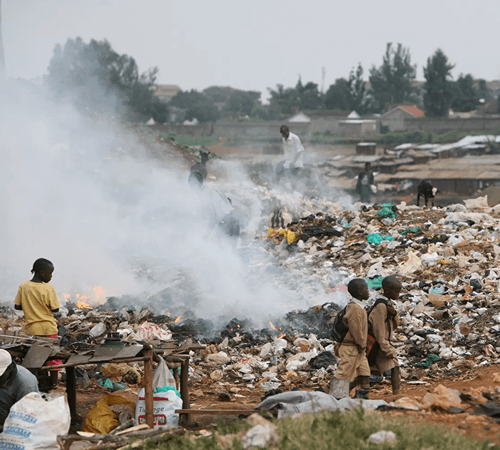
Mbarara city slum of Kizungu in South Western Uganda. Photo credit to ICODI
Challenge
Mbarara City in South Western Uganda is facing a huge challenge in managing its municipal solid waste. The current collection efficiency is 41% and with 0.005 and 0.024 tonnes of solid waste generated daily per household and per company respectively among approximately 469,200 households and 248 companies, it means that 59% of solid waste generated daily is likely burnt. This exposes the population of 1.2m people to fine particles, dioxins, volatile organic compounds, polycyclic aromatic hydrocarbon and polychlorinated biphenyls linked to the increasing cases of heart diseases, cancer, skin diseases and respiratory illnesses as well as increasing black carbon emissions to the atmosphere contributing to climate change.
Approach
To address the challenge, the project will conduct community assessment of the impact of open burning municipal solid waste then raise awareness of the impact among key stakeholders such as citizens, city policy makers and implementers. This will help formulate policies to reduce and eventually stop open burning and improve the collection efficiency of solid waste.
The project will also raise awareness of the health and safety risks faced by informal workers by training company leaders and informal workers from different municipal solid waste collection companies. Training will focus on waste segregation/sorting and characterization, collection and disposal as well as encouraging companies to purchase personal protective equipment (PPE) for informal workers.
Improving human health and livelihood through reducing open burning waste in Senegal
| Lead organisation | Practical Action Consulting |
| Project lead | Papa Idrissa Diene |
| Project partners |
Ecole Polytechnique de Thiès (EPT), Société nationale de gestion intégré des déchets (SONAGED) |
| Grant type | Impact |
| Focus Country | Senegal, Dakar |
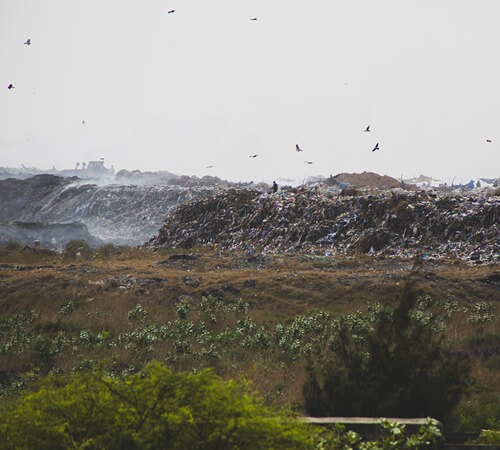
Mbeubeuss dump, Dakar, Senegal. Photo credit to Bineta NASR, Vidal Group
Challenge
In Dakar alone, between 2,300 and 2,600 tonnes of waste are produced every day. Senegal's national waste management system is overwhelmed by the constant increase in waste volumes. Waste is not sorted at source, there is significant potential for waste recovery that is not being exploited, and there are major limitations on waste disposal. The practice of open burning of waste is therefore becoming commonplace, with major consequences on human health and the environment. Informal workers are among those most affected, often working without PPE. Studies have shown that more than 20% of their income is spent on health care.
Approach
This Research-Action project is based on a systemic approach with a strong human focus, helping to reduce the volume of waste arriving at landfill sites by raising household awareness and then identifying relevant recovery and disposal options. All of this will be accompanied by capacity-building for stakeholders. The project will also seek to reduce the impact of open burning waste on the health of informal workers by providing them with PPE and an early warning system to monitor air quality in the landfill. Learning and scaling up are also at the heart of the project.
Living in Gehanna
| Lead organisation | WASTE Advisers |
| Project lead | William Bray |
| Project partners | Capital Radio |
| Grant type | Awareness raising |
| Focus Country | Malawi, Blantyre |
Challenge
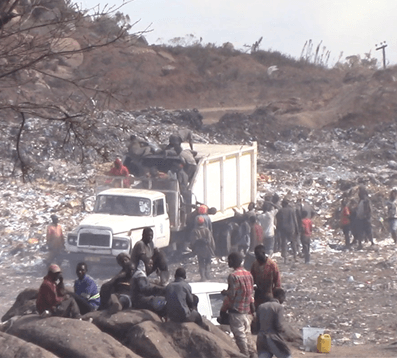
Residents storming a waste truck in Blantyre City dumpsite. Photo credit to William Bray
Gehenna is described as a place of torment for lost souls where the maggots never die, and the fire is never quenched. Malawi is a very religious country with over 95% of the population having a monotheistic worldview in which Gehenna is known and feared by all. However, what is not known, is that Gehenna accurately described the “landfills” in Malawi where forgotten people make a living sorting through the rubbish of society. There are constant fumes of burning plastics and rotting organic waste.
Approach
This project aims to tell the story of residents living on the Mzedi dumpsite just outside of Blantyre for the purpose of finding better solutions for waste management. The primary objective is to create awareness about the people living at this dumpsite and to support residents to separate their waste and mark hazardous waste clearly.
Project Lafiya - a multimedia awareness campaign for open burning impact in Abuja, Nigeria
| Lead organisation | Zenafri |
| Project lead | Elizabeth Kperrun |
| Project partners | Centre for Family Health Initiative, Global Environmental Conscious Initiative |
| Grant type | Awareness raising |
| Focus Country | Nigeria, Abuja |

Project lead, Elizabeth Kperrun
Challenge
Like much of Africa, Nigeria has a waste management problem with open dumping and burning being the primary method of solid waste disposal. Most of the waste management is powered by informal workers trying to make a living, unaware of the health impacts from open burning. These informal workers often live with their families (including vulnerable family members like the elderly and children) close to dumpsites and consume the polluted air and water in these areas. It is necessary to build awareness on the impact of open burning, develop possible mitigation methods whilst avoiding negative impact to the livelihoods of informal workers.
Approach
Project Lafiya (Lafiya meaning Health in Hausa Language) aims to increase health and safety awareness amongst the most is advantaged groups impacted by the open burning of waste. Using the power of engaging entertainment, the project will produce a film that will raise awareness of open burning, its negative impact on the environment and vulnerable groups in nearby communities as well as suggest practical solutions to reducing the practice.
Projects in Asia
An open burning (waste) free city framework: institutionalisation for scale in Andhra Pradesh and Telangana, India
| Lead organisation | Administrative Staff College of India (ASCI) |
| Project lead | Prathibha Ganesan |
| Project advisor | Professor V. Srinivas Chary |
| Grant type | Impact |
| Focus Country | India |
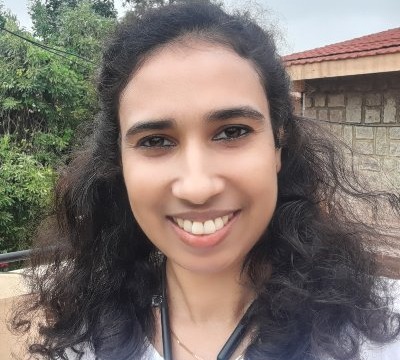
Project lead, Prathibha Ganesan
Challenge
The Solid Waste Management Rules, 2016 in India prohibits burning solid waste in household premises, public places, and dumpsites. However, human-induced and natural waste burning is still rampant in the country, particularly in vulnerable garbage points and dumpsites, effecting the environment and public health. India has over 3000 active dumpsites. The poor and marginalised communities inhabit these sites. Open burning disproportionally effects the communities, particularly women, children and sanitation workers engaged in dumpsite management.
Approach
The project aims to institutionalise a framework in Andhra Pradesh and Telangana to prevent the open burning of waste and to positively impact at least two lakh (0.2 million) vulnerable people living near dumpsites. ASCI identifies that even after introducing regulations in India, open burning persists because of the lack of advocacy, evidence-based decision-making, poor implementation and weak capacities. Therefore, institutionalising a framework for preventing open burning is crucial. ASCI will use multiple strategies, including research, advocacy, capacity building, implementation action plans and rehabilitation of the vulnerable communities, working with the support of the Andhra and Telangana state governments to institutionalise the Open Burning Free Framework.
Itogon municipal waste open burning practices and compliance
| Lead organisation | Adventist Development and Relief Agency |
| Project lead | Geraldina Gutierrez |
| Project partner | Zero Waste Baguio Inc |
| Grant type | Baseline study |
| Focus Country | The Philippines, Municipality of Itogon |
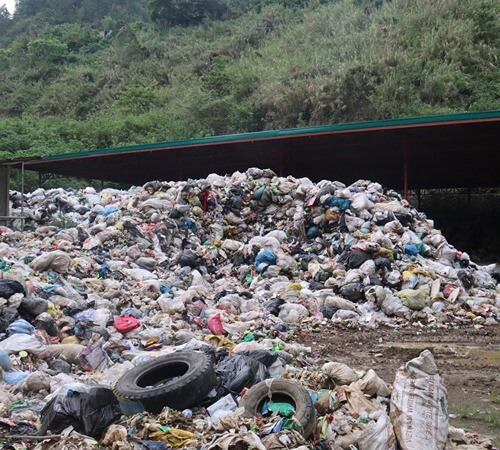
Photo credit to Renalie Zenine Cabatu
Challenge
According to local authorities in Itogon, open waste burning is a perennial issue especially for remote barangays with occasional or no access to waste collection services. There is little to no data making it difficult for the local authorities to quantify the scale and exact nature of this issue, this increases the challenge in tackling this issue. Many households when surveyed, noted that they are unaware of laws prohibiting open burning and the health and safety implications of open burning.
Approach
The aim of this baseline study is to help inform the local municipality of Itogon about the prevalence and incidences of open waste burning and its health effects. From this, localised information and education campaigns will be developed, utilising the evidence-based data for policy advocacy at the level of the Barangay (village), municipality, in the Baguio City, La Trinidad, Itogon, Sablan, Tuba and Tublay metropolitan areas (BLISTT). The data will enable communities and their governments to democratically engage with each other.
Mapping of open burning of municipal waste in Pakistan and Identification of underlying factors and key drivers
| Lead organisation | Circular Plastics Institute at Karachi School of Business and Leadership |
| Project lead | Shiza Aslam |
| Project partner | NED University, Indus Valley school of art and architecture, COMSATS University Islamabad, and ENGRO Foundation |
| Grant type | Baseline study |
| Focus Country | Pakistan, Karachi and Lahore |
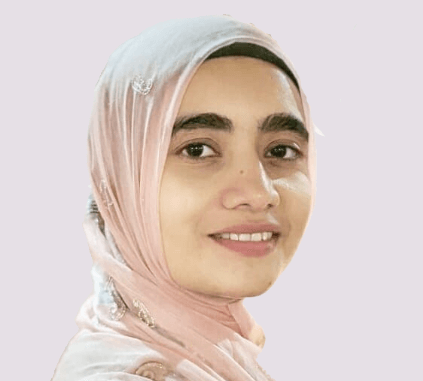
Project lead, Shiza Aslam
Challenge
Anecdotal evidence suggests that incidents of open burning are related to multiple social vulnerabilities such as poverty or limited access to adequate waste management services and there is a limited understanding of its health and environmental impacts. Intentional burning by communities, municipalities, and value chain actors (waste pickers, recyclers) is often seen in Pakistan but due to a lack of data in this space, evidence of the practices is not verified.
Approach
To enhance Pakistan’s capacity in establishing sustainable waste management practices and its commitment to ‘leave no one behind’, it is important to scientifically identify areas, spaces, sources, and substances of open burning occurrence, and verify the leading drivers and factors behind it. The project will map hotspot areas, model trajectories of pollution transport to communities, and explore characteristics of communities to identify critical areas and populations at risk. Local stakeholder workshops will be organized to discuss priority actions and enhance understanding and capacity of key stakeholders, including local governments and vulnerable groups, on the causes and impacts of open burning.
Don’t burn but earn: waste management in the capital city of Pakistan
| Lead organisation | Sustainable Development Policy Institute |
| Project lead | Ejaz Ahmad |
| Project partner | Institute of Urbanism |
| Grant type | Awareness raising |
| Focus Country | Pakistan, Islamabad |
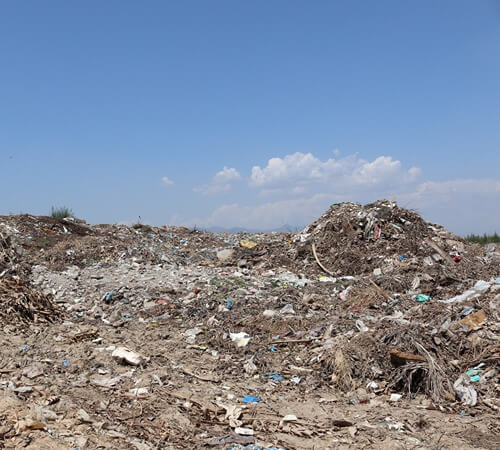
Rubbish dumping in Islamabad. Photo credit to Mr. Asmatullah, Institute of Urbanism
Challenge
Pakistan generates around 30 million metric tons of municipal waste annually and is growing by 2.4 percent annually. In the Islamabad Capital Territory waste management and disposal is handled by the Capital Development Authority. An inadequate waste management capacity and a lack of available collection containers results in the open burning of waste. This is done by both frontline workers and communities despite bylaws in place prohibiting the practice.
Approach
This project aims to build capacity of both citizens and workers through engagement with the media on a sensitisation campaign to raise wider public awareness on the impacts of open burning on human health and environment. The project will work with youth and establishing a youth task force, focusing on an eco-innovation mentorship scheme and engaging with policy makers.
Building capacity and changing policy around open burning in Banyuwangi, Indonesia
| Lead organisation | Project STOP, Systemiq |
| Project lead | Mike Webster |
| Grant type | Impact |
| Focus Country | Indonesia, Banyuwangi Regency |
Challenge
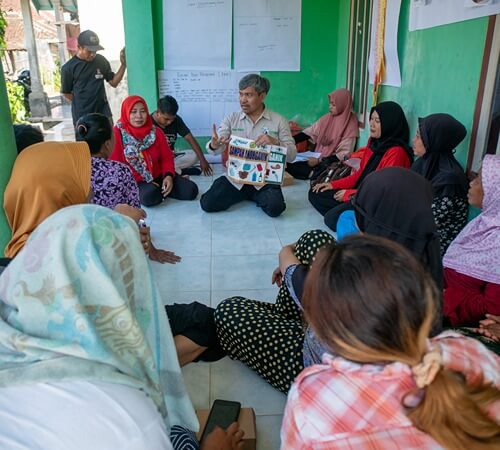
Community waste management socialisation. Photo credit to Project STOP Banyuwangi
Only 39% of the population in Indonesia receive waste collection, with over 26M tonnes of waste leaking into the environment annually. Whilst national law and local regulations prohibit burning and dumping of waste this is widely ignored due to the lack of alternative waste management options. A 2019 national study found that 50% people use open burning as their primary method of waste disposal. In the target area of Banyuwangi Regency, East Java, 78% of waste in Banyuwangi is currently unmanaged, with 41% of people burning waste as the primary method of waste disposal.
Approach
Co-founded by Systemiq and Borealis, Project STOP uses a proven ‘system-enabler’ approach in which a specialist team supports the local city in designing and implementing low-cost, circular waste management systems. The project expects to do this through working with the Regency of Banyuwangi and other stakeholders to engage them with open burning, raising awareness and promote enforcement action.
Open burning of municipal solid waste in Sri Lankan harbours
| Lead organisation | University of Central Lancashire |
| Project lead | Professor Karl Williams |
| Project partners | Marine and Oceanic Research & Administration |
| Grant type | Baseline study |
| Focus Country | Sri Lanka, Dikkowita, Panadura, Mutual and Beruwala Harbours |
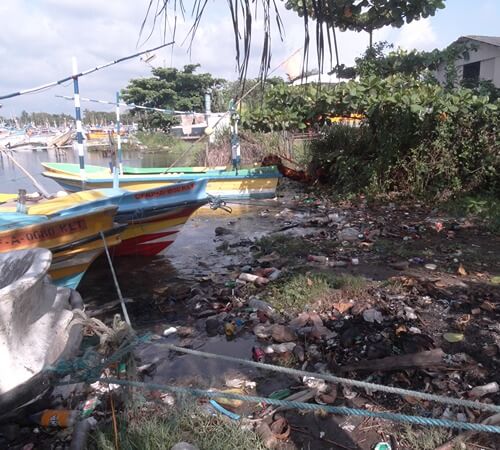
Beruwala Harbour Sri Lanka. Photo credit to Professor Karl Williams
Challenge
Plastic pollution is one of the most pressing global issues and threatens both the marine and coastal environment either through release or burning. Commercial fishing activities are one of the prominent plastic sources. Commercial fishing fleets deposit their waste within harbour premises where there is minimal waste collection, so any collections concentrate on high-value plastics such as bottles. All other remaining waste is destined for open burning.
Approach
This project will examine a possible solution to divert material away from open burning into alternative and sustainable waste management routes in harbours. There has been no quantitative and compositional analysis of municipal waste accumulated and burnt within harbour premises and this study will address this gap. The project will also highlight the current health and environment implications arising from open burning in harbour areas on denizens and local communities. Through air quality monitoring the project will provide robust data, in the form of heat maps and models to show the extent of pollution. This will result in a policy brief with recommendations for improvement of waste management in harbours to improve health, environmental and social impacts.
Mitigating waste burning and dumping in the Indian Himalayan Region
| Lead organisation | Waste Warriors Society |
| Project lead | Vishal Kumar |
| Grant type | Awareness raising |
| Focus Country | India, Dehradun, Uttarakhand |
Challenge
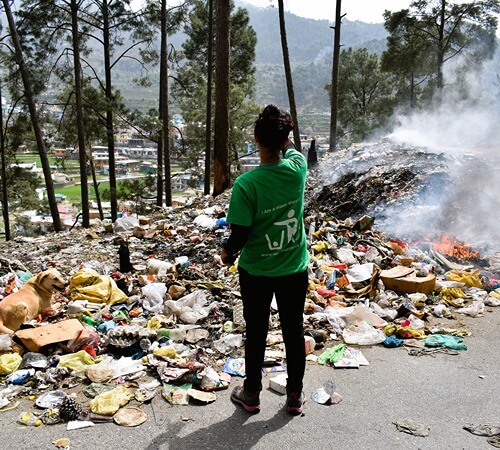
Dumpsite In Purola, Uttarakhand. Photo credit to Waste Warriors
Waste burning, intentional and unintentional, is causing direct and indirect problems in the Indian Himalayan Region. Unlike relatively lower altitude regions, mountains are highly sensitive to such practices as the black carbon deposits on the ice sheets and glaciers, further exacerbating glacial melting rates and cause outburst and flash floods. Not only this, waste burning has dire consequences for flora and fauna as it drives away key pollinators thus reducing crop yields every year. Additionally, the increased rates of child morbidity and mortality, infant and neonatal mortality, respiratory illnesses, reduced brain function and cancer prevalence are all linked to rampant waste burning and dumping practices.
Approach
For the last 10 years, Waste Warriors Society has been striving to create dignified employment opportunities and drive behavioural change towards waste through information, education and communication (IEC). The focus is around source segregation and managing waste with decentralised waste banks and material recovery facilities to create self-sustainable models by empowering often exploited informal waste workers, especially women. Through continuous engagement with government and community stakeholders and existing experience in the region the project will seek to reduce waste burning and dumping, drive behavioural change and create dignified livelihoods.
Projects in the Middle East
UAWC: Upscaling Awareness and Waste Characterization in remote Bedouin communities of Jordan
| Lead organisation | Applied Science Private University |
| Project lead | Professor Rania Aburamadan |
| Project partners | Future Pioneers, Disi Basin Municipality |
| Grant type | Baseline study |
| Focus Country | Jordan, Disi District and Wadi Rum |
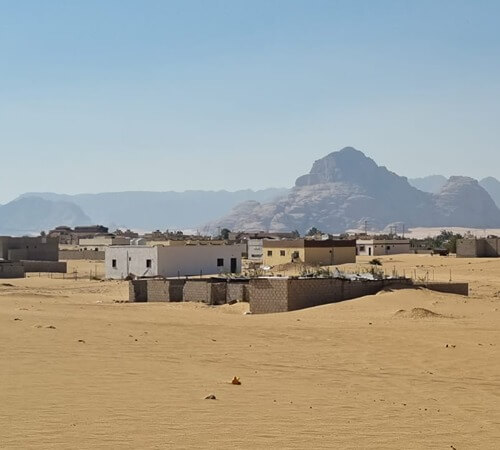
Village in the Disi District. Photo credit to Qais Hamarneh
Challenge
The marginalization of rural Bedouin communities and municipalities in Jordan and the wider region has led to deterioration of the solid waste sector, environmental degradation of protected areas and disengagement of vulnerable communities who are most affected. A lack of data, understanding and awareness of risks has led to open burning of waste in households, villages and communities. These practices are threatening the health and safety of the residents of the remote Bedouin communities in Jordan.
Approach
To address the information gap, a waste characterisation study will be completed for the disi district, which is representative of the rural Bedouin communities in Jordan. The project includes a participatory awareness raising campaign, focussing on long-term impact which will engaging with marginalised groups to create positive social and behavioural changes. A knowledge platform will also be developed to collect, document and disseminate all project’s key messages and outcomes.
Projects in Latin America and the Caribbean
The gendered dimensions of open waste burning
| Lead organisation | ImpaXus |
| Project lead | Delila Khaled |
| Project partners | USAID Clean Cities, Blue Ocean (CBBO) |
| Grant type | Baseline study |
| Focus Country | Dominican Republic, Las Terrenas and Santa Bárbara de Samaná municipalities |
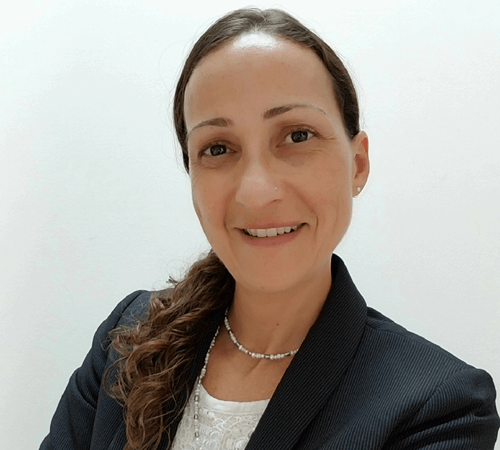
Project lead, Delila Khaled
Challenge
While limited data exists around open burning of waste, research on the topic has been trending upward in recent years. This research, however, focuses on the scientific and legal aspects of open burning, with limited social science-based analysis to contextualize the problem where it is most prevalent, among the informal recycling sector, poor households and communities. Within these spaces, little is understood about the gendered dimensions of open burning. Addressing this gender blind spot is critical to mitigation efforts in low-income countries given the documented association with both informal waste picking and household burning – two domains wherein women play a significant role.
Approach
The project aims to increase understanding and awareness of the gendered dimensions of open waste burning including the socio-economic drivers and consequences for women, men, the informal recycling sector, and other underrepresented groups. It aims to catalyse further research and action among influential sector stakeholders to integrate gender considerations in their open waste burning-related mitigation activities. This will be done through a literature review, expert interviews, and a case study drawing on USAID CCBO activities, producing a research paper and a roundtable with USAID CCBO to share findings.
Evidence and impacts of open burning of cables in Brazil
| Lead organisation | FUNDUNESP |
| Project lead | Ricardo Gabbay de Souza |
| Grant type | Baseline study |
| Focus Country | Brazil |
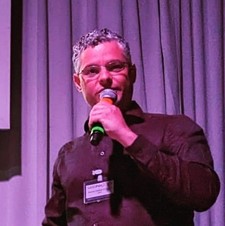
Project lead, Ricardo Gabbay de Souza
Challenge
Open burning of cables is a common practice in developing countries like Brazil, where there is an intensive participation of the informal sector in waste streams. This practice is adopted as an easy way to obtain high-grade copper by burning the plastic (mostly PVC) coating, what turns into toxic flue gases, containing contaminants like COx, NOx, HCl, and other particulates. In addition to causing environmental impacts like Global Warming and Acidification, these emissions can also harm human health, particularly to informal actors carrying on the practice and the surrounding communities. There is large evidence that this practice is widely applied in Brazil, but there is no available data compiling and registering its likely frequency and intensity, neither an estimate of the respective potential impacts.
Approach
This project will investigate, summarise and analyse evidence of cables being openly burnt in Brazil, while assessing the potential environmental and human health impacts associated with this practice, aiming to raise awareness of these risks among the informal actors. The project expects to produce reports and scientific publication on the occurrence of the practice in the Brazilian regions, the profile and awareness of involved actors, market prices for burnt copper, chemical characterization of air emissions and the estimated life-cycle impacts associated with it.
